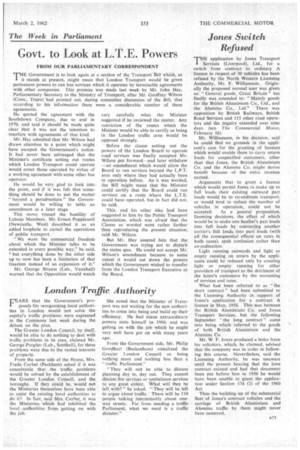Jones Switch Refused
Page 59

If you've noticed an error in this article please click here to report it so we can fix it.
THE application by Jones Transport Services (Liverpool), Ltd., for a switch from contract to ordinary A licence in respect of 30 vehicles has been refused by the North Western Licensing Authority, Mr. F. Williamson. Originally the proposed normal user was given as: "General goods, Great Britain" but finally was amended to: "Mainly goods for the British Aluminium Co., Ltd., and the Alumina Co., Ltd." There was opposition by British Railways, British Road Services and 115 other road operators and the inquiry extended over nine days (see The Commercial Motor, February 16).
Mr. Williamson, in his decision, said he could find no grounds in the applicant's case for the granting of licences which would enable them to carry return loads for unspecified customers. other than that Jones, the British Aluminium Co. and the Alumina Co. might derive benefit because of the extra revenue earned.
Arguments that to grant a licence which would permit Jones to make tip to full loads their existing outward part loads would be to co-ordinate transport, or would tend to reduce the number of vehicles in operation, could not be accepted. As a general proposition, licensing decisions, the effect of which would be to snake one haulier's part loads into full loads by converting another carrier's full loads into part loads (with all the consequential effects on rates in both cases), spelt confusion rather than co-ordination.
Light running outwards and light or empty running on return by the applicants could be reduced only by creating light or empty running for other providers of transport to the detriment of the latter's customers by the worsening of services and rates.
What had been referred to as "the short contract" had been submitted to the Licensing Authority in support of Jones's application for a contract A licence in May, 1956. This was between the British Aluminium Co. and Jones Transport Services, but the following September "the long contract" came into being which referred to the goods of both British Aluminium and the Alumina Co.
Mr. W. F. Jones produced a letter from his solicitors, which, he claimed, advised that the company was in order in following this course. Nevertheless, said the Licensing Authority, he was unaware until the present hearing that the long contract existed and had that document been put before him in 1956 he would have been unable to grant the application under Section 174 (2) of the 1960 Act.
Thus the building up of the substantial fleet of Jones's contract vehicles and the carriage of British Aluminium and Alumina traffic by them might never have occurred.




















































































































































